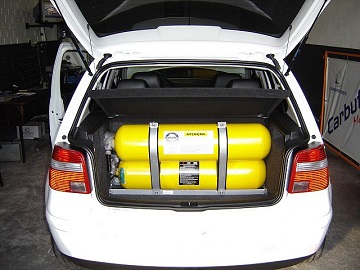The soaring cost of petrol in Nigeria has prompted a search for alternative fuel sources, with Compressed Natural Gas (CNG) emerging as a viable option. Andre Bassey, CEO of Ax Gas, a company specializing in CNG auto conversion, asserts that converting petrol-powered vehicles to CNG is now within the financial reach of average Nigerians, contrary to popular belief. He emphasizes that the conversion process doesn’t necessitate a hefty upfront investment, particularly for standard car models like the Toyota Corolla. Instead, Ax Gas offers flexible payment plans, allowing car owners to spread the cost of conversion, typically ranging between N200,000 and N300,000, over two or three installments. This approach aims to make the transition to CNG accessible to a wider segment of the population, particularly salary earners who may not have substantial lump sums readily available.
While the cost for converting smaller cars remains relatively affordable, Bassey acknowledges that owners of larger vehicles, particularly SUVs, may face higher conversion expenses due to the increased complexity and capacity of their engines. The larger engines require more substantial modifications to accommodate CNG, impacting the overall cost. However, even with these higher costs, the long-term savings from using CNG, which is generally cheaper than petrol, can still make the conversion a worthwhile investment. This is particularly relevant in the current economic climate where fuel prices are a significant burden for many Nigerians.
A key challenge hindering the widespread adoption of CNG vehicles, according to Bassey, is the limited availability of CNG refueling stations, often referred to as “daughter stations.” He underscores the need for government intervention to support investors in establishing these crucial infrastructure components. The scarcity of CNG stations creates inconvenience and discourages potential converts who fear the difficulty of refueling their vehicles once converted. This bottleneck requires urgent attention to build a robust CNG ecosystem and facilitate the seamless transition to this alternative fuel source.
Bassey appeals to the Federal Government to provide financial assistance to investors interested in building CNG daughter stations. He suggests several potential avenues for government support, including subsidized loans directly from the Central Bank of Nigeria or through international financial institutions like the World Bank. Access to affordable funding is crucial for investors to overcome the high capital costs associated with building CNG refueling infrastructure. This investment in infrastructure is essential to create a viable and sustainable CNG market in Nigeria.
The success of the CNG initiative, according to Bassey, hinges on the government’s proactive role in addressing the infrastructure gap. He argues that without readily accessible refueling stations, the public’s interest in converting to CNG may wane, hindering the potential benefits of this alternative fuel. By facilitating the development of a robust CNG refueling network, the government can not only stimulate private investment but also create jobs and contribute to a cleaner environment. The long-term benefits of transitioning to CNG extend beyond individual cost savings to encompass broader economic and environmental advantages for the nation.
Therefore, the adoption of CNG as a vehicle fuel in Nigeria presents a multifaceted opportunity. It provides a more affordable fuel option for consumers, particularly during periods of high petrol prices. It also offers the potential for economic growth through the development of a new industry centered around CNG conversion and refueling. Finally, the use of CNG contributes to environmental sustainability by reducing the reliance on more polluting fossil fuels. However, realizing these benefits requires a collaborative effort between the private sector and the government, with the latter playing a crucial role in facilitating the necessary infrastructure development and providing financial support to incentivize investment in the CNG sector. The successful implementation of this initiative could significantly impact Nigeria’s transportation landscape and contribute to a more sustainable and affordable energy future.














